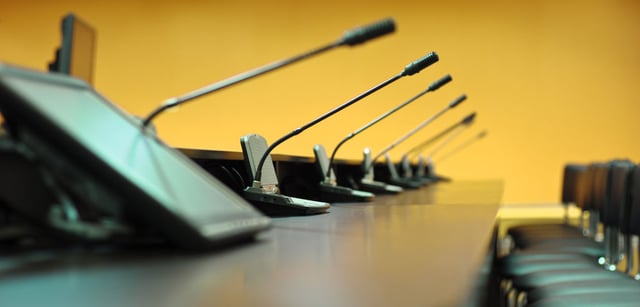 Do you have a panel appearance coming up at a business conference? Here's how to be a successful panelist while making your company look good!
Do you have a panel appearance coming up at a business conference? Here's how to be a successful panelist while making your company look good!
Have you been invited to appear on a panel? If so, congratulations. It means you're recognized as a leader in your industry who has something of value to offer. And while it may not have you flying solo, it's very much an opportunity for you to shine.
So, why do some of my clients hate the prospect so much?
Interested in theater-inspired techniques to remain in The Zone, whatever the venue? Download my free cheat sheet, "10 Ways to Stay Fully Focused When Speaking."
Some people are intimidated by panels because they don't know what's coming and feel they can't prepare properly. For these speakers, a formal presentation—even a high-stakes one—is preferable. After all, in those situations they know what they'll be saying. If there's Q & A at the end, well, that just goes with the territory. But unanticipated questions fired your way from the beginning? Yikes!
Yet a panel discussion is without doubt an invitation to be memorable. Let's look at four ways that can happen, and how rearranging your mental furniture can make you absolutely present in the room.
 How to Use Your Opening Remarks Strategically
How to Use Your Opening Remarks Strategically
You and the other panelists will probably be asked to give a few opening remarks. That's usually along the lines of "Tell us a bit about yourself and your company and what you're focusing on right now." Sounds like an invitation to be off-the-cuff and casually introduce yourself to the audience, right?
It's actually something much more important: one of the few opportunities you'll have at this panel to stand out from the competition. These 3-5 minutes, or whatever the suggested time, are important for two reasons. First, this is the only time where you'll be able to make your case without simply responding to what's asked of you. Second, the starter gun has just gone off, and you'd better realize right now you need to hit the water cleanly and powerfully.
Haven't you experienced the following? Four panelists introduce themselves and explain a bit about their work. By the time they're finished, you already know who the heavyweight is on the panel, and who tips the scale at a slightly lesser weight. The other two panelists aren't going to be in contention; and you may even ask yourself: "What's this person doing here?" This isn't always the case, though it frequently is. Audiences form strong impressions quickly, and stay anchored to them. You don't want to sink beneath the surface before you can even get your stroke going, do you?

It's Not a High-Stakes Presentation, Right? Yes, It Is!
So your opening remarks must be tight and have impact. Depending on the caliber of your fellow panelists, this event may be a standing-room only situation. If that doesn't equal high stakes, what does?
True, you don't clearly have the starring role as you do in a keynote. But consider this: Good panels often feature leaders in your industry, or those on the cutting edge. You're up against stiff competition, and you have to hold your own.
But here's some good news that you share with theatrical performance: every actor is hoping that the person on stage with them at least as talented as they are. Nothing makes you look worse than having weak performers around you—while sharing the stage with consummate professionals calls forth your personal best. It's no different on a business stage than in a play.

Have You Researched the Other Panelists?
Did you ever watch a team presentation—maybe a business pitch—and wonder: "Have these people ever presented together?" A lot of our professional time is spent at our own desk or on our own phones, without the opportunity to present our ideas as a team. Call it the Silo Effect. When the opportunity arises to make, for instance, a four-person team presentation, the audience ends up with this: An obvious boss, one person who sounds like she knows what she's talking about, and two potted plants.
Understand, it's not as though those two folks aren't also knowledgeable. They just get lost because the team actually isn't used to performing like one. For one thing, the pleasure of informed conversation and banter is missing. When it's present, on the other hand, audiences enjoy it and think: "These people are likable . . . I'm enjoying listening to them." Wouldn't it be great to try to give your conference audience that sensation?
When I suggest to clients that they do a little research on their fellow panelists to help foster dialogue and conversation like this, they're often surprised. But why not? Anything that raises the quality of the performance as a whole will benefit you individually (and of course, your organization). And establishing a personal connection with a fellow leader in your field might pay dividends someday.

Here's Hoping You Have a Strong Moderator
Remember the principle I talked about above, that solid fellow performers will raise your game? The same goes collectively for the moderator. A conscientious and active moderator can help take a panel from perfunctory to thought-provoking and even exciting. We can tell pretty early on whether the person has done their homework prior to the event, or is just filling the role of breathing human being corralled into standing behind the lectern.
Strong moderators grab interesting ideas as they fly between audience and panel, and bring them to the table. They play an active role in furthering the action—probing and speculating and wondering out loud how what's been introduced plays out in the context of the developing discussion. Everything is enriched by this type of moderator.
If you find that you're not blessed with this brand of the breed, you should feel free to take up some of the mantle yourself. Without becoming controlling and obnoxious, can you follow up on what's just been said, directing a question to a fellow panelist? It's another way you'll stand out from the crowd.
So, if you're like my clients who dread business panels because they can't plan out beforehand what they'll say, use the strategies above. They offer ways to speak powerfully and on point, and to come across as a true player in a team of distinction.
You should follow me on Twitter here.



